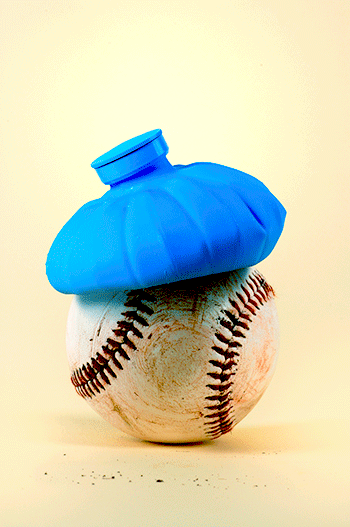
Written by: William Primos, MD
Active people who suffer acute infectious illnesses like cold and flu frequently have questions concerning participation in sports and physical exercise during their illness. They may be strongly motivated to continue regular activities despite their illness. They may be reluctant to either “get behind in their training” or “let the team down.”
When deciding whether or not to sit out, individuals should consider how the illness would affect their performance and also how participation would affect both their health as well as the health of others.
How does illness affect my performance?
Acute illness can hinder athletic performance by influencing several different body systems. The function of the heart is usually altered during a febrile illness with decreased strength of the heart muscle resulting in lower cardiac output and a too-rapid heart rate during exercise. There is also decreased muscle strength and also decreased lung function. These various effects on the body all can limit athletic performance with decreased endurance, strength, speed, concentration, and coordination. If an athlete is not able to perform at his normal level, the goals of the team would probably be better served by using another team member who can perform more effectively than the sick person.
Strenuous exercise may cause worsening of their symptoms, increase the severity of the illness, or cause complications. Vigorous exercise may also hamper the body’s immune response, resulting in a decreased ability to fight off and recover from an infection.

One example of an illness that may be worsened by exercise is in a person with a respiratory tract infection. These infections are often associated with swelling and increase secretions in the airways. Exercise may cause bronchospasm in the airways with increased coughing, wheezing, and shortness of breath.
Splenic rupture is a potentially life-threatening complication of infectious mononucleosis. In mononucleosis, the spleen may swell. It may rupture during activities, especially with direct contact with the abdomen. People with “mono” are usually advised to avoid strenuous sports until the spleen is back to normal size. This may take a few to several weeks.
Another group of diseases that might be worsened or complicated by exercise is enterovirus infection. Enteroviruses usually cause respiratory or gastrointestinal illness, but they may also cause myocarditis, an infection of the heart muscle. When a person’s heart has myocarditis, there is increased susceptibility to permanent damage and even sudden death during exercise. Because of the possibility of myocarditis, it has been recommended that individuals who have systemic symptoms such as fever and body aches avoid strenuous activity.
Another concern that may influence participation is whether other participants would be infected by being exposed to the sick person. Some infections are easily spread during sports events, especially those sports in which there is close contact between the participants. The spread of infection may occur through several different mechanisms. Infection may be spread through contact with nasopharyngeal secretions and infectious skin lesions. Infection may also be transmitted by contact with contaminated objects such as mats, towels, and water bottles.
In Conclusion
In summary, individuals should not participate in activities if other participants would be exposed to a contagious illness. They should also avoid participation if they would possibly harm their health. To help determine if one’s health is at risk during exercise, they can use a “neck check” of their symptoms. If they only have symptoms “above the neck” such as nasal congestion, runny nose, earache, sore throat, then he/she can probably safely try participation. However, if the person has “below the neck” symptoms such as muscle aches, cough, fever, chills, stomachache, vomiting, or diarrhea, it would be wise to avoid strenuous exercise. By following these recommendations, athletes who have acute illnesses may prevent complications and make a safe return to full activity.
Schedule An Appointment
For questions, more information or to schedule an appointment, please contact NGPG Orthopedic Surgery & Sports Medicine.
About NGPG Sports Medicine
NGPG’s Sports Medicine Team consists of board-certified physicians offering more than 20 years of sports medicine experience treating patients of all ages. Specialized in treating sports-related injuries, our team is dedicated to helping athletes return to the big game and the active lifestyle they know and love.
About William Primos, MD
 Dr. William Primos is a board-certified sports medicine provider at Northeast Georgia Physician’s Group. He has more than 20 years of sports medicine experience treating patients of all ages. His area of specialization include:
Dr. William Primos is a board-certified sports medicine provider at Northeast Georgia Physician’s Group. He has more than 20 years of sports medicine experience treating patients of all ages. His area of specialization include:
- Concussion Management
- Elbow Injuries
- Foot & Ankle Injuries
- Hand & Wrist Injuries
- Knee Injuries
- Shoulder Injuries
- Ultrasound Guided Injections
Dr. Primos received his medical degree from University of Mississippi School of Medicine and completed his post graduate training in primary care, sports medicine and adolescent medicine at University of Wisconsin Hospital & Clinic. He also completed a pediatric residency at University of Mississippi Medical Center.
